Transforming a Nation | Pharmacy Podcast Network
The Pharmacy Podcast Network is committed to playing a small part in ’Transforming a Nation’ through our commitment to the advocacy for pharmacist & the critical role they lead in healthcare. This new podcast series will dive deep into racism, racial disparities in healthcare, gender bias, and what we can do together to change this nation. We invite all pharmacists & healthcare professionals to participate in this series published through the PPN reaching 80,000+ listeners per month & ranked in the top 20 podcasts in business along with Becker’s Healthcare Podcast, Wall Street Journal’s Podcast, & the Marketplace Podcast
Episodes
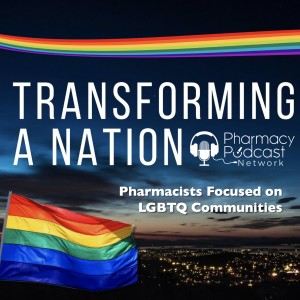
Friday Mar 05, 2021
Pharmacists Focused on LGBTQ Communities | Transforming a Nation
Friday Mar 05, 2021
Friday Mar 05, 2021
Our guests today are Michelle Sherman, RPh, who is a member of the Pharmacy Podcast Network & has a podcast called the "Conscious Pharmacist Podcast" & Jay Holloway PharmD, returning for a second time to the Pharmacy Podcat to discuss:
References, from Pharmacy Today:
https://www.pharmacytoday.org/article/S1042-0991(20)30876-8/fulltext
Pharmacists Focused on LGBTQ Communities, the latest chapter of the "Transforming a Nation" podcast series.
Pharmacists need to acquire foundational knowledge about key concepts and terminologies relevant to the LGBTQ population.
To provide care consistent with cultural competence and humility, pharmacists must also be aware of the diversity between and within different segments of the LGBTQ community, and the intersectionality of multiple identities that shape a person’s life experiences. Furthermore, it is important to note that while various identities such as gender, sexual orientation, and gender identity intersect, one is not predictive of the other. For example, a person’s gender identity does not determine their sexual orientation and the biological sex designated at birth does not define their gender identity.11Sexual orientation is a person’s emotional, romantic, sexual attraction, or non-attraction to other people and is composed of three separate dimensions: behavior, identity, and desire. Some people may engage in same-sex sexual behavior but not identify as lesbian, gay, or bisexual. Similarly, a person may be sexually, romantically, or emotionally attracted to members of the same sex and choose not to be sexually active with same-sex partners. For research purposes, the terms “men who have sex with men” (MSM) and “women who have sex with women” (WSW) are often used to describe a person’s sexual behavior regardless of their identity.
Sex refers to a set of biological attributes primarily related to physical and physiological features. The phrase “sex assigned at birth” (SAAB) or “designated sex at birth” (DSAB) is used to describe a person’s biological sex, most often, but not exclusively, based on the external appearance of genitalia at birth. Gender is a socially constructed concept used to characterize the behaviors, actions, and qualities of women and men or girls and boys. The critical flaw of an exclusive binary paradigm is that it does not account for the inherent diversity of human gender. A more expansive conceptualization of gender recognizes that each person possesses a wide range of characteristics that may or may not be consistent with the gender binary, represent a combination of male and female, or fall somewhere in between the two.
Gender identity is a person’s inner sense of their gender. For some people, their gender identity may not be congruent with the one typically expected based on their SAAB/DSAB. They may describe themselves in a variety of ways including, but not limited to, transgender, male, female, gender fluid/genderqueer, nonbinary, agender, or as another gender. Decisions to change gender expression and/or physical appearance to be more consistent with their gender identity through medical (e.g., hormone replacement therapy), nonmedical (e.g., voice therapy, choosing an affirming name, etc.), and/or surgical options (e.g. gender affirmation/confirmation surgery) is wholly determined by the individual.
The National LGBTQIA+ Health Education Center
https://www.lgbtqiahealtheducation.org/
See omnystudio.com/listener for privacy information.
Learn more about your ad choices. Visit megaphone.fm/adchoices
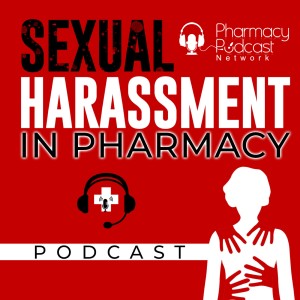
Wednesday Oct 21, 2020
Ending Sexual Harassment in Pharmacy | Transforming a Nation
Wednesday Oct 21, 2020
Wednesday Oct 21, 2020
Today’s ‘Transforming a Nation’ Podcast episode 5 in the series, focuses on ending the inexcusable Sexual Harassment in the Profession of Pharmacy. Our host of this episode is Dr. Rebecca Smith @RebeccaESmith on Twitter, who started bringing massive awareness to this reoccurring issue.
See tweet here:
https://twitter.com/rebeccaraesmith/status/1308161152988270592?s=20
Rebecca's guests are always testifying about their experiences with Sexual Harassment in pharmacy, including Brooke Barlow, PharmD who's a PGY2 Critical Care Pharmacy Resident at University of Kentucky, Ashley Barlow PharmD PGY2 Oncology Pharmacy Resident at MD Anderson Cancer Center, and Jackie Johnston, PharmD a Surgical Trauma Neuro ICU PharmD & Clinical Assistant Professor PGY-1 RPD.
References:
Addressing Sexual and Gender Harassment in Pharmacy Education to Improve Provider Wellness and Patient Care
https://www.ncbi.nlm.nih.gov/pmc/articles/PMC7223926/
Frequency and severity of sexual harassment in pharmacy practice in Ohio
https://pubmed.ncbi.nlm.nih.gov/10533349/
This episode is sponsored by: UltiGuard Safe Pack is the only pen needle product that comes with an all-in-one sharps container. Learn more about why UltiGuard Safe Pack is the best choice for your patients and your pharmacy.
Learn more UltiGuard Safe Pack https://www.ulticare.com/ultiguard-safe-pack/podcast
See omnystudio.com/listener for privacy information.
Learn more about your ad choices. Visit megaphone.fm/adchoices
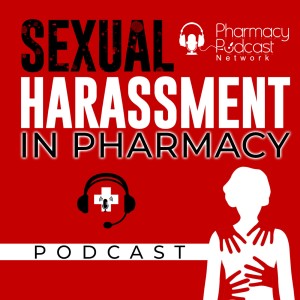
Tuesday Sep 29, 2020
Sexual Harassment in Pharmacy | Transforming a Nation
Tuesday Sep 29, 2020
Tuesday Sep 29, 2020
Today’s ‘Transforming a Nation’ Podcast episode 4 in the series, focuses on inexcusable Sexual Harassment in the Profession of Pharmacy with Brittany Bissell, PharmD is a Medical ICU Clinical Pharmacist and Adjunct Assistant Professor at the University of Kentucky & Mojdeh Heavner PharmD is Assistant Professor, Department of Pharmacy Practice & Science at the University of Maryland School of Pharmacy.
The tweet from Dr. Rebecca Smith @RebeccaESmith on Twitter:
https://twitter.com/rebeccaraesmith/status/1308161152988270592?s=20
References:
Addressing Sexual and Gender Harassment in Pharmacy Education to Improve Provider Wellness and Patient Care
https://www.ncbi.nlm.nih.gov/pmc/articles/PMC7223926/
Frequency and severity of sexual harassment in pharmacy practice in Ohio
https://pubmed.ncbi.nlm.nih.gov/10533349/
Sponsored by UltiGuard Safe Pack
The UltiGuard Safe Pack is the only pen needle product that comes with an all-in-one sharps container. Learn more about why UltiGuard Safe Pack is the best choice for your patients and your pharmacy.
Learn more UltiGuard Safe Pack
https://www.ulticare.com/ultiguard-safe-pack/podcast
See omnystudio.com/listener for privacy information.
Learn more about your ad choices. Visit megaphone.fm/adchoices
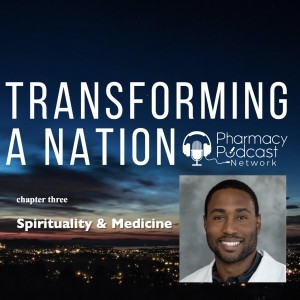
Wednesday Sep 09, 2020
Spirituality in Medicine | Transforming a Nation
Wednesday Sep 09, 2020
Wednesday Sep 09, 2020
Dr. Richard Harris M.D., Pharm.D, MBA joins the 'Transforming the Nation' series to discuss the controversial topic of sharing your faith, being spiritual, and understanding the balance between science, medicine, and God. Dr. Harris is the founder of "Great Health & Wellness" and has his own podcast, here: https://www.theghwellness.com/
The technological advances of the past century tended to change the focus of medicine from a caring, service oriented model to a technological, cure-oriented model. Technology has led to phenomenal advances in medicine and has given us the ability to prolong life. However, in the past few decades physicians have attempted to balance their care by reclaiming medicine's more spiritual roots, recognizing that until modern times spirituality was often linked with health care. Spiritual or compassionate care involves serving the whole person—the physical, emotional, social, and spiritual. Such service is inherently a spiritual activity. Rachel Naomi Remen, MD, who has developed Commonweal retreats for people with cancer, described it well:
Helping, fixing, and serving represent three different ways of seeing life. When you help, you see life as weak. When you fix, you see life as broken. When you serve, you see life as whole. Fixing and helping may be the work of the ego, and service the work of the soul.
Serving patients may involve spending time with them, holding their hands, and talking about what is important to them. Patients value these experiences with their physicians. In this article, I discuss elements of compassionate care, review some research on the role of spirituality in health care, highlight advantages of understanding patients' spirituality, explain ways to practice spiritual care, and summarize some national efforts to incorporate spirituality into medicine.
References:
The role of spirituality in health care
Christina M. Puchalski, MD, MS
https://www.ncbi.nlm.nih.gov/pmc/articles/PMC1305900/#:~:text=In%20summary%2C%20spirituality%20can%20be,of%20delivery%20of%20compassionate%20care
Sponsored by UltiGuard Safe Pack
The UltiGuard Safe Pack is the only pen needle product that comes with an all-in-one sharps container. Learn more about why UltiGuard Safe Pack is the best choice for your patients and your pharmacy.
Learn more UltiGuard Safe Pack
https://www.ulticare.com/ultiguard-safe-pack/podcast
See omnystudio.com/listener for privacy information.
Learn more about your ad choices. Visit megaphone.fm/adchoices
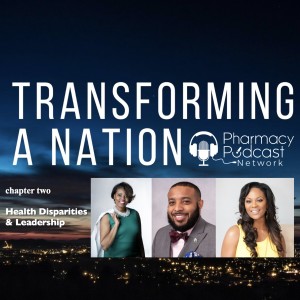
Tuesday Aug 25, 2020
Health Disparities & Leadership| Transforming a Nation
Tuesday Aug 25, 2020
Tuesday Aug 25, 2020
Part 2: Transforming a Nation
A “health disparity” refers to a higher burden of illness, injury, disability, or mortality experienced by one group relative to another. A “health care disparity” typically refers to differences between groups in health insurance coverage, access to and use of care, and quality of care.
Healthcare disparities continue to exist despite increased awareness of and attention to their existence. The causes of healthcare disparities are, for many patients and patient populations, multifaceted and highly complex. The program will focus on the healthcare disparities that exist for patients with diabetes and address how pharmacists and other pharmacy personnel can address healthcare disparities.
Have you experienced Bias (race, gender or age) in the workplace
How to increase representation of people of color in healthcare (pharmacist- 66%white, 22% Asian, 5.2% Black)
How does this help decrease disparities?
The pharmacist's role in reducing health disparities
Heath and racial disparities and how they relate to the pharmacy world?
What can we do about systemic racism in healthcare?
Social determinants of health and how they contribute to disparities
How do we eliminate barriers to improve equity in healthcare?
Pharmacy Desserts and how this affects health disparities
Action that we can take from the obvious racial disparities that have been highlighted through COVID-19?
Guests:
Dr. Jamie Hardy, PharmD.
Board Certified Pharmacist
Dr. Frank North, PharmD.
Consultant Pharmacist at The Rowe Network
Dr. Stephanie Young Moss, PharmD, MS
Director, Health Economics and Outcomes Research Partnerships
References:
Understanding Health Disparities in Pharmacy
Kristen Coppock, MA, Managing Editor
https://www.pharmacytimes.com/conferences/aacp-2020/understanding-health-disparities-in-pharmacy
See omnystudio.com/listener for privacy information.
Learn more about your ad choices. Visit megaphone.fm/adchoices
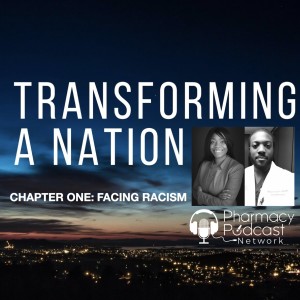
Monday Jul 27, 2020
Facing Racism | Transforming a Nation
Monday Jul 27, 2020
Monday Jul 27, 2020
The Pharmacy Podcast Network is committed to playing a small part in 'Transforming a Nation' through our commitment to the advocacy for pharmacist & the critical role they lead in healthcare. This new podcast series will dive deep into racism, racial disparities in healthcare, and what we can do together to change this nation.
We invite all pharmacists & healthcare professionals to participate in this series published through the PPN reaching 80,000+ listeners per month & ranked in the top 20 podcasts in business along with Becker's Healthcare Podcast, Wall Street Journal's Podcast, & the Marketplace Podcast
CHAPTER ONE: FACING RACISM - 07/27/2020
Sponsored by: 100X2030https://jhaymeetynan.com/100x2030/
Special Guests Jhaymee Tynan & William Amarquaye, PharmD
Ms Tynan: https://jhaymeetynan.com/about/
GhanaBoy PharmD: https://www.youtube.com/channel/UChO5d7BqAkAyawKN6eVtr1w
Twitter: https://twitter.com/GhanaboyPharmd
References:
Racism and discrimination in health care: Providers and patients
https://www.health.harvard.edu/blog/racism-discrimination-health-care-providers-patients-2017011611015
Racism in care leads to health disparities, doctors and other experts say as they push for change
https://www.washingtonpost.com/health/racism-in-care-leads-to-health-disparities-doctors-and-other-experts-say-as-they-push-for-change/2020/07/10/a1a1e40a-bb9e-11ea-80b9-40ece9a701dc_story.html
See omnystudio.com/listener for privacy information.
Learn more about your ad choices. Visit megaphone.fm/adchoices
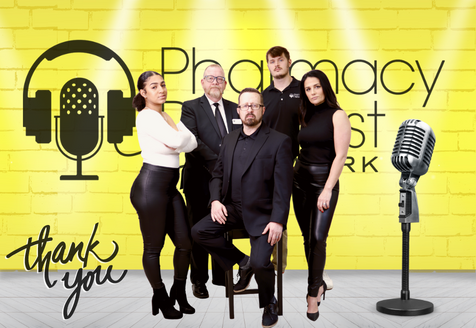
Thanks for Listening!
The Pharmacy Podcast Network team would like to thank you. Our success could not be possible without our listeners!
For more content, visit pharmacypodcast.com
